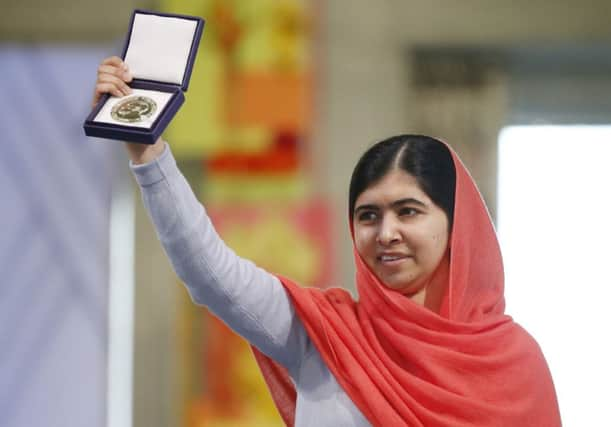Malala gets Peace Prize; demands school for all


The 17-year-old was handed a gold medal and diploma at a ceremony in Oslo, Norway, joining the ranks of laureates including Nelson Mandela, Martin Luther King and Aung San Suu Kyi.
She is the youngest person to receive the honour.
The teenager was jointly awarded the peace prize with Indian children’s rights activist Kailash Satyarthi for her “heroic struggle” in favour of girls’ education.
Advertisement
Hide AdAdvertisement
Hide AdAfter accepting her prize, Malala gave a lecture in which she said: “Leaders must seize this opportunity to guarantee a free, quality primary and secondary education for every child.
“Some will say this is impractical, or too expensive, or too hard. Or even impossible. But it is time the world thinks bigger.
“Dear sisters and brothers, the so-called world of adults may understand it, but we children don’t. Why is it that countries which we call strong are so powerful in creating wars but are so weak in bringing peace?
“Why is it that giving guns is so easy, but giving books is so hard? Why is it that making tanks is so easy, but building schools is so hard?
CONNECT WITH THE SCOTSMAN
• Subscribe to our daily newsletter (requires registration) and get the latest news, sport and business headlines delivered to your inbox every morning
“We are living in the modern age, and we believe that nothing is impossible. We have reached the moon 45 years ago and maybe we’ll soon land on Mars. Then, in this 21st century, we must be able to give every child quality education.
“Dear sisters and brothers, dear fellow children, we must work not wait. Not just the politicians and the world leaders, we all need to contribute. Me. You. We. It is our duty.”
As she was given her prize a young man made his way on to the stage and unfurled what appeared to be the flag of Mexico.
Advertisement
Hide AdAdvertisement
Hide AdHe began to speak to Malala but was removed by security guards after a few seconds. Malala appeared unfazed.
She began speaking out for the rights of girls at the age of 11 and came to prominence after surviving an assassination attempt in October 2012 when her calls for equal rights angered militants in her native Pakistan.
In her lecture, she said: “This award is not just for me. It is for those frightened children who want education. It is for those frightened children who want peace. It is for those voiceless children who want change. I am here to stand up for their rights, to raise their voice. It is not time to pity them. It is time to take action, so it becomes the last time that we see a child deprived of education.”
She added: “I tell my story not because it is unique, but because it is not. It is the story of many girls.”
Malala was 15 when she was shot in the head by a Taleban gunman in Swat District, in north-western Pakistan. She was airlifted to Dubai and then on to Birmingham. Unable to return to her homeland due to continued threats, she is now based in Birmingham.
The Nobel Prize committee said: “Despite her youth, Malala Yousafzai has already fought for several years for the right of girls to education, and has shown by example that children and young people too can contribute to improving their own situations. This she has done under the most dangerous circumstances. Through her heroic struggle she has become a leading spokesperson for girls’ rights to education.”
SCOTSMAN TABLET AND IPHONE APPS